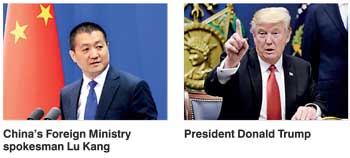Saturday Feb 21, 2026
Saturday Feb 21, 2026
Monday, 27 November 2017 00:00 - - {{hitsCtrl.values.hits}}
 Sydney (Reuters): Australia called on the United States last week to build a strong presence in Asia and bolster ties with “like-minded” partners while warning against China’s rising influence.
Sydney (Reuters): Australia called on the United States last week to build a strong presence in Asia and bolster ties with “like-minded” partners while warning against China’s rising influence.
A more insular United States would be detrimental to the liberal nature of the world’s “rules-based order”, the Government said in a 115-page foreign policy white paper.
“Australia believes that international challenges can only be tackled effectively when the world’s wealthiest, most innovative and most powerful country is engaged in solving them,” the Government said.
The white paper is a guide for Australian diplomacy and provides a roadmap for advancing its interests. The election of President Donald Trump represented a step towards a more isolationist world, which could be negative for Australia’s export-dependent economy, commentators have said.
Trump withdrew from the Trans-Pacific Partnership regional trade agreement in January, shortly after he took office.
“Strong and sustained US engagement in the international system remains fundamental to international stability and prosperity,” the government said in the paper.
“Without such engagement, the effectiveness and liberal character of the international order would erode.”
Australia is one of the staunchest US allies and troops from the two countries have fought alongside each other in all major conflicts for generations.
But the economic growth and power that the United States has enjoyed since the end of the World War Two is now being challenged by China, Australia said. Australia and China have close economic ties but China is suspicious of Australia’s close military relationship with the United States.
‘Tensions, benefits’
Australia warned in the paper of risks it faces, particularly in the “Indo-Pacific region” due to a shift in the balance of power.
It highlighted the South China Sea as a “major fault line in the regional order”, and said it was “particuarly concerned by the unprecedented pace and scale” of China’s land reclamation and construction activities in the disputed waters.
China’s Foreign Ministry spokesman Lu Kang told a regular briefing that the paper was on whole a positive assessment of China’s development, which he said adhered to the global rules-based order, and of relations between China and Australia.
But Lu said the paper did make “irresponsible remarks” on the South China Sea for which China expressed its concerns.
While the government recognised the economic benefits from China’s rise, it was also trying to “wish China away”, said Jane Golley, deputy director at the Australian Centre on China in the World, Australian National University.
“To actually drop the word ‘Asia’ from ‘Asia-Pacific’ undoes three decades of diplomatic effort,” Golley said, referring to the use of the phrase “Indo-Pacific” which came up 120 times in the paper. “Asia-Pacific” was not used once.
The United States and some of its allies have recently been talking up their vision of the “Indo-Pacific”, instead of the “Asia-Pacific”, in a play on words aimed at undermining the influence of China.
“There is a small reference to China’s geo-economic strategy in the paper but the emphasis is on the tensions that could create, rather than the economic benefits,” Golley said.
“We’ll have to see how China reacts to this but they’re not going to like this policy.”
Relations between Australia and China sank to a low point this year after Australia rejected high-profile Chinese investments, citing “national interest”.
Australia has also shown little enthusiasm for China’s ambitious Belt and Road initiative, which aims to connect China to Europe and beyond with infrastructure projects.
The initiative was mentioned just once in the paper.
“We are not embracing the future,” Golley said.
“We are holding on to the past and reaching on to the life jacket rather than thinking of building a whole new ship.”